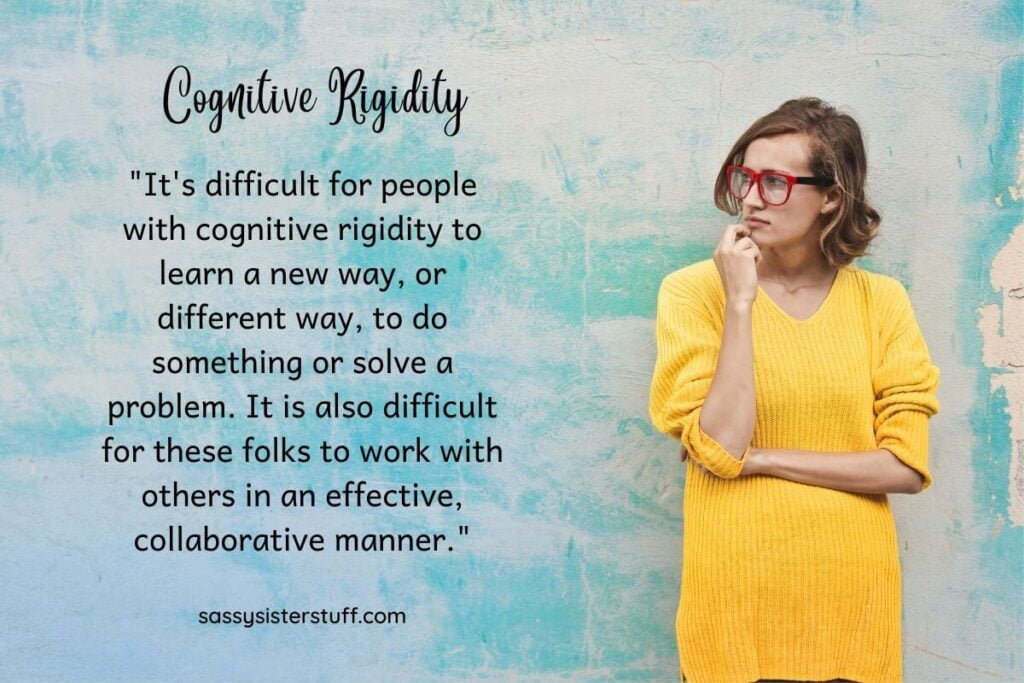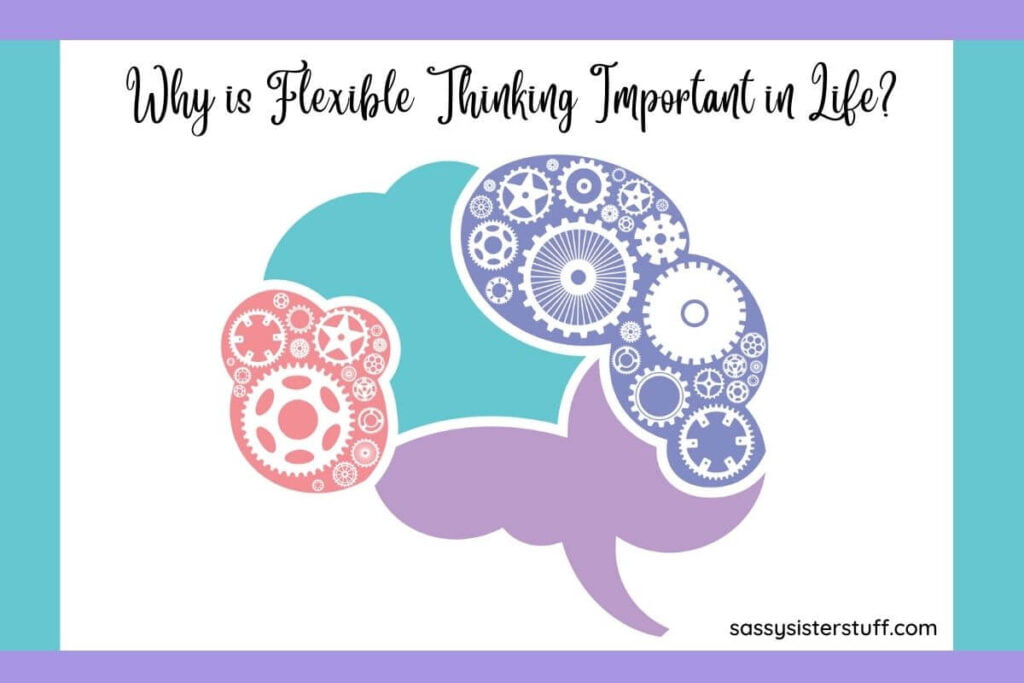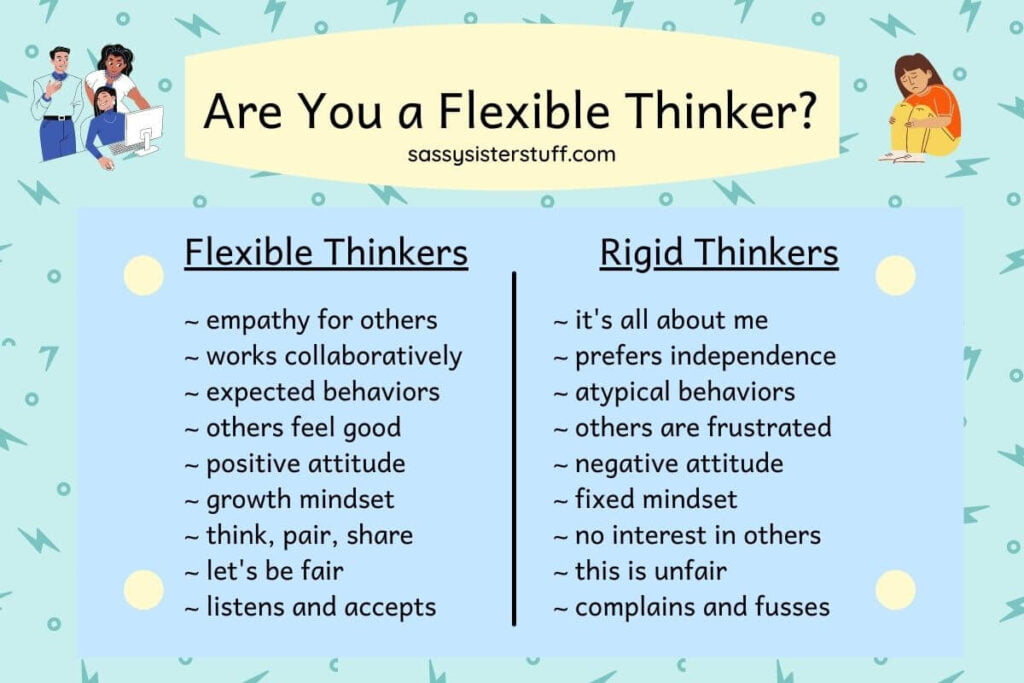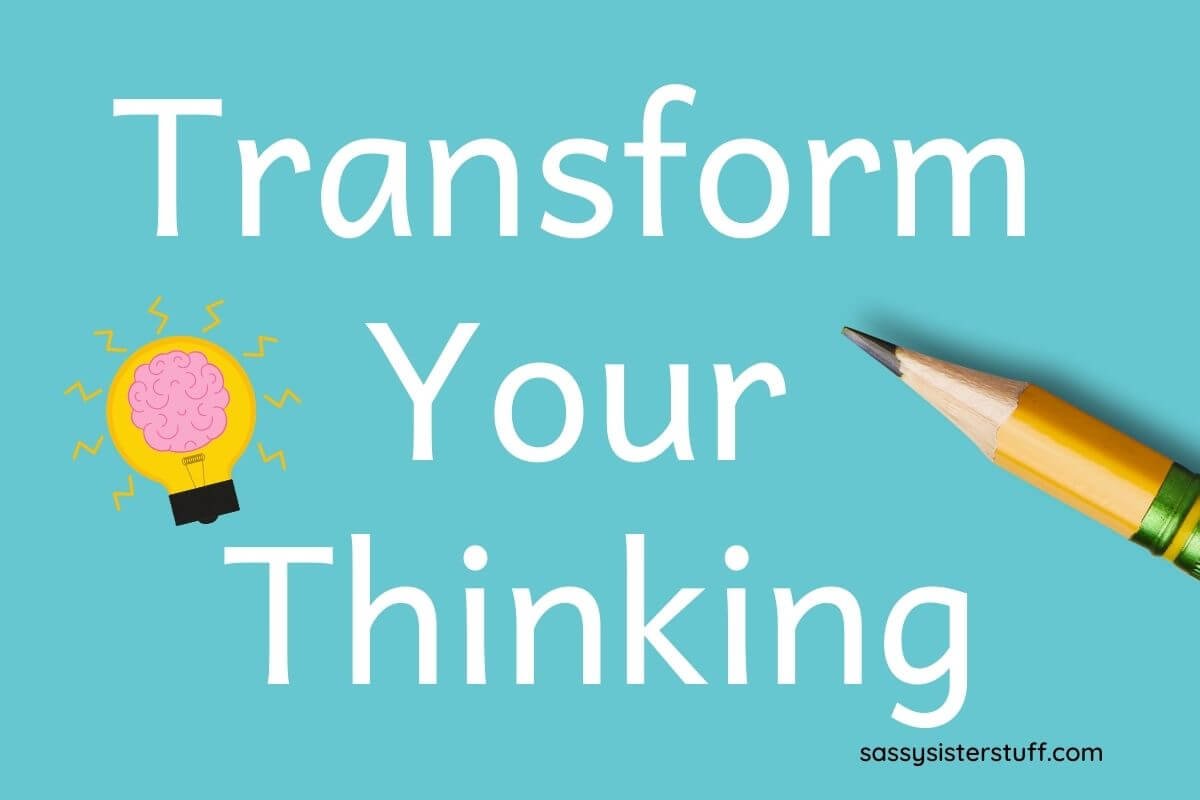Why is Flexible Thinking Important in Your Life?
In this article, you will learn why it is important to have strong flexible thinking skills in today’s world and how you can become more flexible in your thinking. You will also learn common terms associated with flexible thinking such growth mindset, cognitive flexibility, mental flexibility, and resilience — as well as terms associated with rigid thinking that can cause you anxiety, social problems, adaptation challenges, and acceptance.
In a world that is constantly changing and posing challenges for all of us — adults and children — it is important to be able to accept complex issues and uncertainty. It is also important to have flexible thinking skills so you have an open-mind toward problem solving and conflict resolution.

Learning to be more flexible in life is essential if you want to live your best life.
You’ll find all the information you need to focus on flexible thinking right here — whether you are looking to make major improvements, or just learn more about flexible thinking skills! So let’s get busy!
What is Flexible Thinking?
Flexible thinking, also known as cognitive flexibility and mental flexibility, helps you understand and accept others’ experiences, processes, routines, lifestyles, and decisions. It helps you learn that your way is not the only way. It is associated with tolerance, exploration, open-mindedness, curiosity, and growth.
Wikipedia defines cognitive flexibility as: an intrinsic property of a cognitive system often associated with the mental ability to adjust its activity and content, switch between different task rules and corresponding behavioral responses, maintain multiple concepts simultaneously and shift internal attention between them.
Now let me put that information in terms most of us can understand! Wink:)
Having the mental flexibility to switch your way of thinking, change your mind, and even simultaneously think of multiple concepts at once is an important skill for children and adults to learn. For some people, it comes more naturally, and for others, flexible thinking is a learned skill. But it is critical to have these skills because LIFE is full of times when you need to be flexible in your thinking — especially in today’s world — with so many changes happening all the time!
Flexible thinking is also associated with a growth mindset, whereas rigid thinking is associated with a fixed mindset. A growth mindset allows you to consider all options and confidently make decisions that help you grow as a person and be open to acceptance of others; a fixed mindset limits your potential by disavowing options for growth, acceptance, and different perspectives. I think you can probably understand the connections.
What Causes Cognitive Rigidity?
An example of cognitive rigidity is black-and-white thinking, which is a considered a mindset that causes people to think in absolutes. These people are often unable to process alternative suggestions or ways of doing things. Cognitive rigidity is considered a psychological cognitive distortion because it keeps people from seeing and accepting the reality around them.

Cognitive rigidity is caused by a lack of mental flexibility. It is an inability to change behavior or beliefs regardless of consequences. For example, even if there is a better way to solve a problem, someone with mental rigidity will typically be unable to shift their mindset to reach an effective outcome. Cognitive rigidity often causes behavior and social problems for adults and children.
People with cognitive rigidity have a strong desire for predictability, repetition, high expectations, structure, and routine. It can even lead to perseveration and compulsions.
Cognitive rigidity is associated with a mental set where people can only see solutions that have worked in the past and are not open to new ideas. This fixed thinking can significantly impede the problem-solving process or any collaborative efforts.
It’s difficult for people with cognitive rigidity to learn a new way, or different way, to do something or solve a problem. It is also difficult for these folks to work with others in an effective, collaborative manner.
Flexibly thinking allows you to learn new ways of doing things, accept different ways of thinking and living, and work or live with others collaboratively.
For more information about the importance of life experiences that teach you how to exist and prosper in the world, read this article, Education is Key to Success: But Does That Mean?.
Flexible Thinking Examples
Let’s consider an example of flexible thinking for children:
Tabitha is a child with rigid thinking and a diagnosis of high-functioning autism. The adults in her life are helping her learn to be more flexible in her thinking so she will not throw temper tantrums when something unexpected occurs. Tonight, her favorite TV show was preempted for a political debate. She began to spiral into a temper tantrum when she discovered the change.
Her parents quickly grabbed a scripted prompt that included the following discussion questions to review with Tabitha:
- 1. What can we do instead of watch your show tonight?
- 2. Let’s see when the show is going to be on again and we’ll watch it then, okay?
- 3. We will see if we can find it On Demand tomorrow and watch it after school, okay?
- 4. I understand your frustration, but what is a better way to deal with it right now?
- 5. Have you used your Calm Down strategies? Can you tell me your Calm Down Strategies?
Over time, and with practice, Tabitha will develop more flexible thinking skills and learn to avoid temper tantrums which can significantly impact her social emotional development.
Pin to Pinterest for Later
Now let’s consider an example of flexible thinking for adults:
An adult who lives alone, works close to her home, doesn’t go many places, and struggles with social skills and collaborative decision-making, has just received an ineffective work evaluation because of mental rigidity. She wants to make changes before it’s too late, but isn’t sure how to do so. She consults with a counselor about how to become more flexible in her thinking and more accepting of others.
The counselor recommends a few things to her: 1) change your daily routine to include going to one place you’ve never been before every day (a new gas station, a new grocery store, a new gift shop, a new walking path, etc); 2) join a creative crafting class or book club one time per week with people you’ve never met before; 3) do something spontaneous every week (take a different route to work, park in a different space, eat lunch at a different time, skip watching clothes, take a nap, etc).
Additionally, the counselor recommends: 4) Pay attention to your thoughts and language — substitute anything that doesn’t serve you in a positive manner with something more open-minded; 5) challenge your morals once a week (go 5 miles over the speed limit, skip church one Sunday, laugh at an adult joke, watch a TV show with bad language, etc).
Over time, as she is exposed to different perspectives and ways of thinking, these activities will help her brain learn to bend and become more flexible.

So Why is Flexible Thinking Important in Life?
Flexible thinking is important in life because you are open to acceptance of others and their views and you are able to adapt to change and road-blocks. Flexible thinking gives you more resilience. It allows you to think outside your box and change your routine or structure when necessary.
Cognitive flexibility not only opens your world to new experiences and perspectives, but it makes you a more likable and collaborative person. Generally, you have a more positive mindset with more compassion and empathy for others.
Can You Improve Cognitive Flexibility Skills?
Absolutely. The two examples above under the sub-heading, Flexible Thinking Examples, provide some ways to improve cognitive flexibility skills, plus you will find many strategies for children and adults to improve mental flexibility below.
Flexibility in thinking is critical to a balance, peaceful, and productive life. Flexibility of thinking helps you adjust more easily to change. People who are rigid in their thinking and views of the world have a much more difficult time in life and tend to struggle to find happiness.
How to Develop Cognitive Flexibility Skills
Teaching flexible thinking is very important, especially for students with Autism or others who have disabilities that cause them to struggle with mental flexibility. Special education teachers, classroom teachers, and speech-language pathologists should work together to help all all students who struggle with flexible thinking.
But not all kids who struggle with cognitive flexibility are on the autism spectrum. Sometimes cognitive rigidity is just a personality trait — sometimes it is due to past trauma — and sometimes we may not know a reason. But as adults, we should try to help all children with flexible thinking skills because it will help them be more successful in life.
Adults who struggle with flexible thinking will hopefully realize their lives would improve if they made some changes in their rigid thinking and fixed mindset. It’s very possible to make changes at any age or stage of life — especially if you want to open your world to new possibilities!

Some additional flexible thinking activities for children include:
- 1) tell silly jokes, riddles, and make puns;
- 2) make up new rules for games they have played before;
- 3) explore more than one way to do everyday things;
- 4) read books together like Amelia Bedelia where the author plays with words;
- 5) play games together that promote strategic and logical thinking;
- 6) practice “how many ways….” you can solve math problems;
- 7) go to new places and try new foods;
- 8) walk through a decision-making process with the child;
- 9) play categories games that allow you to create multiple categories;
- 10) be a flexible role model when things change;
- 11) offer options frequently so a child can practice making decisions;
When working with children, adults should provide guidance and explanations, as necessary, to ensure that the child fully understands that concept. For example, do they understand the joke or riddle? Do they understand the play on words? Do they understand how to work through a problem?
Some additional flexible thinking activities for adults include:
- 1) don’t always take the easy route or do it the way you’ve always done it;
- 2) go out of your way to meet new people — especially those with cultural differences;
- 3) find a creative outlet — whimsical fun helps the brain become flexible;
- 4) seek out new experiences;
- 5) keep an open-mind to the way other people do things;
- 6) stop your thoughts, inner voices, and comments from being so critical of other people;
- 7) stop trying to control everything around you — accept that you can’t control everything;
- 8) let go of your EGO and realize your way of thinking is NOT the only way.

Final Thoughts About Flexible Thinking
Flexible thinking adults will undoubtedly be happier and more successful in life. I hope the flexible thinking strategies and information I’ve provided here will help you, or a child in your life, learn to be more flexible with your thoughts, words, and actions. Thinking flexibility offers so many benefits for ALL. We can get along better with people around us, feel more positive and open to learning new things, and adapt to change easier.
If you are an adult who is trying to teach a child to be more flexible, be sure to be a flexible role model whenever possible. Sometimes when we are stressed or overwhelmed, we might not be the role model we want to be. But just do your best!
And if you are an adult who is trying to develop more flexible thinking, you can do this! I have every confidence in you because you have gotten to the bottom of this article! You are obviously committed! I wish you the BEST!
Love to All! ~ Susan







